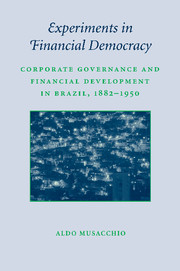 Experiments in Financial Democracy
Experiments in Financial Democracy Book contents
- Frontmatter
- Contents
- List of Figures and Tables
- Preface
- Acknowledgments
- 1 Introduction
- 2 Financial Development in Brazil in the Nineteenth Century
- 3 The Stock Exchange and the Early Industrialization of Brazil, 1882–1930
- 4 The Foundations of Financial Democracy: Disclosure Laws and Shareholder Protections in Corporate Bylaws
- 5 Voting Rights, Government Guarantees, and Ownership Concentration, 1890–1950
- 6 Directors, Corporate Governance, and Executive Compensation in Brazil, c. 1909
- 7 Bond Markets and Creditor Rights in Brazil, 1850–1945
- 8 Were Bankers Acting as Market Makers?
- 9 What Went Wrong after World War I?
- 10 The Rise of Concentrated Ownership in the Twentieth Century
- 11 Conclusion
- Bibliography
- Index
- STUDIES IN MACROECONOMIC HISTORY
Preface
Published online by Cambridge University Press: 30 January 2010
- Frontmatter
- Contents
- List of Figures and Tables
- Preface
- Acknowledgments
- 1 Introduction
- 2 Financial Development in Brazil in the Nineteenth Century
- 3 The Stock Exchange and the Early Industrialization of Brazil, 1882–1930
- 4 The Foundations of Financial Democracy: Disclosure Laws and Shareholder Protections in Corporate Bylaws
- 5 Voting Rights, Government Guarantees, and Ownership Concentration, 1890–1950
- 6 Directors, Corporate Governance, and Executive Compensation in Brazil, c. 1909
- 7 Bond Markets and Creditor Rights in Brazil, 1850–1945
- 8 Were Bankers Acting as Market Makers?
- 9 What Went Wrong after World War I?
- 10 The Rise of Concentrated Ownership in the Twentieth Century
- 11 Conclusion
- Bibliography
- Index
- STUDIES IN MACROECONOMIC HISTORY
Summary
When I started to do research for this book, debate about the policies and legal institutions necessary for the development of financial markets around the world was intensifying both in academic circles and in international financial agencies. As academics reached near consensus on the importance of financial development to foster economic growth, the development of financial markets became a goal of international development agencies and governments in most countries. Discussion moved from how important it was to have stock markets versus banks to how countries could develop financial markets in general. To devise policies that could help countries develop financial markets, however, academics and policy makers first had to understand why financial markets are more developed in some countries than in others.
A natural candidate for explaining these differences was variation in legal institutions across countries. But although social scientists agree that institutions are important in explaining economic and financial development, there is no agreement as to which institutions generate, and which are incidental to, financial prosperity. It could be the case, for example, that important changes in institutions and regulations in the already highly developed U.S. financial system were demanded by actors to further improve the functioning of that market. If so, institutions that favor the development of financial markets might be a consequence rather than a cause of financial development.
Researchers therefore sought to explain the variance in financial markets by looking for institutional differences across countries that would not be a consequence of financial market development.
- Type
- Chapter
- Information
- Experiments in Financial DemocracyCorporate Governance and Financial Development in Brazil, 1882–1950, pp. xv - xxPublisher: Cambridge University PressPrint publication year: 2009
